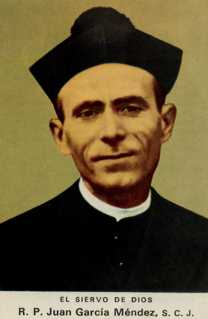On September 22, members of the Priests of the Sacred Heart celebrated the Feast of Blessed Juan Maria de la Cruz, who was beautified on March 11, 2001. At Sacred Heart School of Theology, the September 22 all-school Mass was dedicated to the memory of Blessed Juan. The following is the homily that Fr. Jim Walters, SCJ, SHST director of Hispanic Studies, gave during the Mass. NOTE: Fr. Jim alternated between Spanish and English but only the English text is printed below.

And he sent them to proclaim the kingdom of God and to heal the sick. He said to them: ”Take nothing for the journey, neither walking stick, nor sack, nor food, nor money.”
How many of us have ever given thought of offering up our lives as martyrs? Actually the word martyr comes from the Greek martous meaning: a witness.
The Catechism of the Catholic Church states:
“Martyrdom is the supreme witness given to the truth of the faith: it means bearing witness even unto death. The martyr bears witness to Christ who died and rose, to whom he is united by charity.”
The martyr is a witness to the death and resurrection of the Lord. A witness! Like the first disciples and early Christians for whom St. Luke was writing, the command of Christ is clear and unequivocal: ”take nothing for the journey, trust completely in the Lord.”
Fr. Juan Garcia Mendez who took the religious name, Juan Maria de la Cruz because of his devotion to the Blessed Virgin and Saint John of the Cross, a native city of Avila, was a Priest of the Sacred Heart and a martyr long before he was executed for the crime of being a priest. In the midst of the turbulent years of civil strife in Spain from 1931-36, the Catholic Church suffered one of the most difficult persecutions in its history. With the support of a communist government in Catalonia, churches, seminaries, rectories, monasteries and convents, were sacked and destroyed. Thirteen bishops, 4,184 priests, 2,365 religious brothers, 283 nuns and thousands of lay Catholics were killed.
The power of the witness of these brave men and women led to the beatification of 233 of their number; the first to be proclaimed martyrs in the new millennium by Pope John Paul II. Fr. Juan was a person who trusted not so much in his own strength, but trusted rather in the power of the Lord, a power he discovered as a child growing up and educated in a simple family deeply rooted in its faith. His deep and trusting love in the Sacred Heart of Jesus led him our congregation. His devotion to the Eucharist and Eucharistic Adoration nourished his life of faith.
On July 23, 1936, in the midst of a leftist controlled, anticlerical government in Spain, Fr. Juan traveled incognito to Valencia seeking refuge with one of the congregation’s benefactors. While traveling from the train station he passed the church of “de los Juanes” in the center of the city. There he witnessed men desecrating and burning the church. Fr. shouted in protest. When the men heard his shouting, they said to each other: “He is a reactionary.” He responded: “NO, I am a priest.” He was arrested and taken to the Modelo jail in Valencia. Afterwards, witnesses recalled that Fr. Juan led an exemplary life in prison. He remained faithful to his religious practices and ministered to the pastoral needs of his fellow prisoners. On the night of August 23, 1936, together with nine other prisoners, Fr. Juan was taken south of Valencia to be shot. On August 24, the bodies of the victims were thrown in a common grave.
We are reminded today, that like the disciples sent forth, we are to take nothing for the journey. These words challenge us to rethink our baptismal call in radically different terms. We are challenged to examine and own the fears that hold us captive and prevent us from witnessing to the truth of the Gospel wherever we find ourselves. We rationalize well our fears, convincing ourselves that it might not be prudent, it might make things worse, it might offend, never realizing the great price we pay for our fear.
Martyrs are not a select group of women and men who have been blessed with special gifts and graces and who look forward to the day they will be called to sacrifice their lives. Martyrs are people living among us. They are ordinary women and men who are so convinced and deeply moved by the message of the Gospel that they are willing to put their lives on the line; they take nothing for the journey and completely trust God’s will for them. They are the ones who challenge is to reexamine our values in light of the Gospel. They are the ones willing to risk their reputations and public opinion to speak and live the truth.
Chances are we that have met them and admired them but also have felt uneasy or uncomfortable with their witness. Today the Gospel and example of the life of Blessed Juan Maria de la Cruz remind us that all of us are called to be martyrs (witnesses) who, although we may never shed our blood, will daily be called to witness to the truth we proclaim in every Eucharist, at every Mass: “Christ has died, Christ is risen, Christ will come again.”


